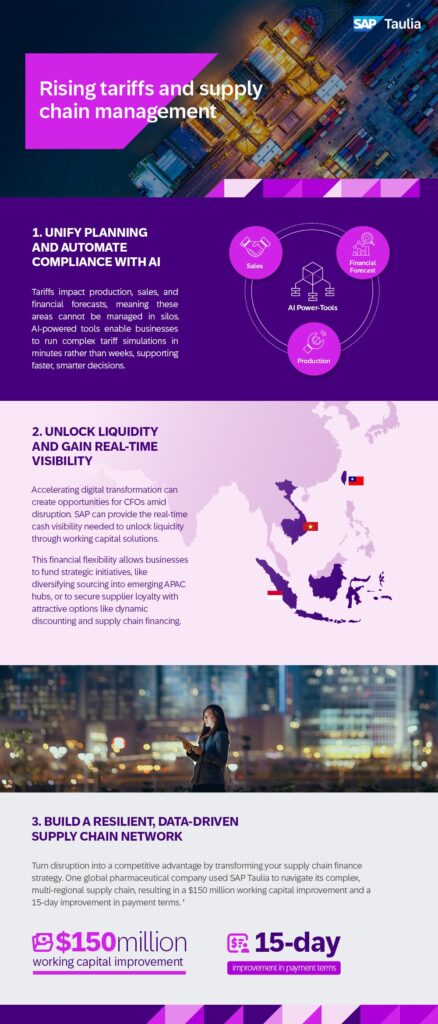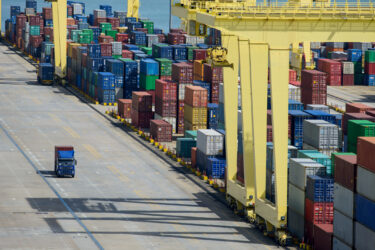Filters
Category
Solution
Adapting and Thriving Amidst Tariff Upheaval
Adapting and Thriving Amidst Tariff Upheaval
Tariffs, regulatory shifts, and supply chain disruptions fundamentally redefine cost structures and market strategies. This places unprecedented pressure on CFOs to balance risk, liquidity, and growth.
In SAP Taulia’s eBook, Impact of Tariffs on Finance, we draw on perspectives from our experts and corporate finance leaders. While the current climate presents significant challenges, it has also created opportunities for businesses ready to innovate.
While businesses cannot control external factors like tariffs, geopolitics, or broad economic uncertainty, they can control their response. Success will be determined by the ability to digitize, plan proactively, and act with agility. It is time for businesses to get their house in order, find the right tools for resilience, and build stable foundations for growth.
Facing the Impact of Tariffs
Tariffs have driven significant shifts in global spend, forcing CFOs to rethink cost structures and sales teams to adapt pricing strategies.
Over the past year, SAP Taulia data highlights a mixed picture of supply-chain reallocation across APAC. China saw a drop from $84.4m to $74.8m (−11%), which suggests that supply chains have shifted away given high tariffs.
However, strong alternative sourcing hubs are emerging. Taiwan (+1,507%), Vietnam (+489%), and Indonesia (+197%) stand out as the biggest winners, which aligns with the narrative that tariff and trade pressure encouraged companies to diversify into alternative APAC countries.
Meanwhile, within Europe early payments in Germany increased by 53%, possibly helped by Germany’s significant fiscal stimulus earlier in the year, which initially boosted investor confidence and drove inflows into European equities to counteract the impact of tariffs.
In one instance, a global pharmaceutical company faced significant challenges managing working capital across its highly complex, multi-regional global supply chain.
By deploying SAP Taulia, this pharmaceutical giant transformed its supply chain financing strategy, creating a resilient, flexible and data-driven network capable of withstanding global trade volatility and tariff uncertainties. The result was a $150 million working capital improvement, 15-day improvement in payment terms, and 600+ supplier enrolments.
Opportunities Hidden in Disruption
However, in the face of such upheaval, tariffs are also adapting quickly and creating opportunities, turning disruption into a competitive advantage.
Many CFOs are seizing the moment to reconsider their location strategy, diversify sourcing, renegotiate supplier contracts, and accelerate digital transformation. Platforms like SAP Taulia are helping CFOs gain real-time cash visibility, improve predictive analytics, and unlock liquidity through working capital solutions.
Accelerating digitalization and AI adoption may be the most significant opportunity. Companies need better tools for productivity, scenario planning, and integrated decision-making.
Tariffs affect everything from production to sales to financial forecasts. They are deeply interconnected and can’t be updated in silos. SAP helps link these plans together so companies can analyze impacts holistically and make faster, smarter decisions.
At the same time, working capital solutions like Taulia are helping businesses adapt their investment strategies. Whether freeing up cash to fund a new plant or offering dynamic discounting to secure supplier loyalty, these tools give CFOs flexibility when markets shift.
With competitors competing for the same suppliers, tactics such as dynamic discounting and supply chain financing can make a company more attractive to work with, which can create a real competitive advantage.
The Mandate for Digital Transformation
Market disruptions expose inefficiencies and highlight the need for better tools and systems. In the ‘gravy days,’ companies often overlook inefficient processes. However, production planning, material tracking, and cash forecasting tools become critical when markets tighten.
Many companies already have powerful tools at their disposal, such as SAP’s planning and inventory systems, but underuse them until disruptions force them to utilize their full capabilities.
Lately, we’ve seen a shift from clients using process improvements to building new technology platforms capable of handling complex data environments and faster predictive insights.
For instance, many private equity firms are investing heavily in upgrading their tech stacks to operate at the speed they need to increase deal volumes.
Companies need more advanced planning mechanisms to integrate cost control, cash flow visibility, and strategic agility. AI-powered forecasting tools can simulate multiple potential futures, enabling CFOs to make real-time decisions and accelerate adaptation in volatile environments.
By integrating agentic AI capabilities through tools like Joule, SAP’s AI assistant, CFOs can run complex tariff simulations in minutes rather than weeks.
Next steps: resilience and growth
As tariffs continue to reshape trade dynamics, we believe the next step is for CFOs to focus on building organizational agility and digital-first capabilities. The next phase is less about surviving disruption and more about preparing for a “new normal” defined by constant change.
Solutions like SAP and SAP Taulia are central to helping companies manage working capital. The SAP Business Data Cloud, layered with AI, enables scenario analyses that integrate production, sales, and financial forecasts into one holistic view.
Meanwhile, SAP’s Global Trade Services automates compliance checks and simulates trade impacts, while the SAP Business Network helps strengthen collaboration between buyers and suppliers. With Taulia’s working capital solutions, businesses gain more flexibility and control.
Ultimately, the only certainty in business is uncertainty. The nimbler and more resilient an organization is, the better it weathers any storm.
Find out how SAP Taulia can be a strategic partner in helping businesses stay compliant, resilient, agile, and competitive in our eBook, Impact of Tariffs on Finance.

SAP Taulia internal insights (2025)


